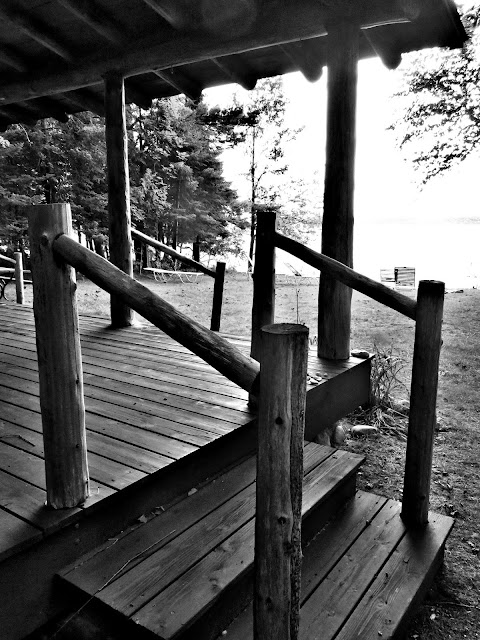I'm not always bright. Or cheery. Most of the time, yes. There's a stubborn streak of optimism that doesn't keep me down too long, that "look on the bright side" characteristic that can be incredibly annoying to those who don't! In fact, if I'm honest I would have to add "cheerful optimism" to my list of what some would consider my more annoying habits (along with nail biting, clutter and one I can't control, my cough!)
But the past week hasn't been filled with happy. I've felt more than a little battered more than once. An elderly friend in hospice. Another who was moved by her daughters to live closer to them in assisted living -- but who was angry about having to leave her home of many years and her friends in this town. And then there was the weekend.
The weekend started out well enough, even though we knew there would be sadness along the way. Rick and I would be saying a final goodbye to Minisa, the cabin on Torch Lake where his family had several wonderful reunions in recent years. While others said their final goodbye in July after the reunion, we were fortunate to have another chance for a last look, before it is mowed down for a new owner to build their new home. But before we went there, we would celebrate with a wedding.
Diane and I had worked together for many years and her daughter, Amelia, was getting married. We went to the wedding, which was on the way up north, as we began our weekend.
Being with a friend on such a special day was really wonderful, the wedding was beautiful -- all systems go. We would be at my happy place -- my little cottage on the lake. It was too early for color, but it would still be quiet. We'd see Rick's cousin Mary. Enjoy being up north. Maybe the weekend wouldn't be so hard after all. We would make the best of a sad situation.
Then we arrived at the cottage. Longtime readers of the Gypsy have seen my postcards from the lake. Our little cottage on Otsego Lake in Gaylord, Michigan, is nothing fancy. None of the cottages on the lake really are. It's not really a "McMansion Lake." It's small, with two bedrooms, an impossibly tiny bathroom, a wonderful view of the lake and a wooded lot next door filled with beautiful, tall pines and bushes that in years past brought baskets of huckleberries that produced wonderful breads and pies. The neighbor's cottage was on the other side of the lot so it felt secluded, up-northy.
When my neighbor Eulah died, the house and lot passed to friends and last year they sold it. I knew the new owners -- who had their own construction company -- would tear down Eulah's little house and build on both lots. But we weren't prepared for what we saw when we arrived.
The lot had been clear cut from the lake to the road. Piles of lumber were stacked tall. Enormous trees -- some we estimated to be 100 years old -- were pulled up by the roots. There wasn't a huckleberry bush on site, save for a row on our property line.


I cried. Rick couldn't sleep. It was like the land had been raped, like you could hear the trees screaming "Why?" We expected trees would come down for the footprint of the house. But every single tree? I guess you don't cover up the monuments.
We woke the next morning and after surveying the carnage, took off for Minisa. Time with Mary and Gus is always good.
Mary showed us photos of Rick's great grandfather, great and great-great grandmother. Beautiful women.



Then we went to Minisa for a last goodbye, for a walk around the cottage, a look within. Contents of the cottage that hadn't been shared with family members were in neat piles for the estate sale company to price and mark. That was tough.


And seeing the house without the long porch table where so many wonderful dinners and late night conversations had taken place was like seeing a beautiful house without its soul.


And it felt a little easier to leave. Only a little.
The soul of Minisa isn't the structure or the treasure trove of things within.



The soul of Minisa is Mary and Gus and all the family that inhabited its walls on summer days for nearly 100 years. And that soul is, in turn, a part of our own.
After an early dinner with Mary, there were smiles. And that was important.
We ran away from the sound of construction equipment clearing the lot the next day and took a road trip. Elmira is the kind of town you go through, not to. A couple of restaurant/bars, a convenience market, a "cute" store, a few battered buildings and a church. But we found that the Railside Bar and Grill had wonderful Polish food and the most delicious perogies. A friend we hoped to see in nearby Boyne City was away -- but his house sitters invited us in for a delightful hour of conversation. And we found a book store and wine shop and tasted olive oils and vinegars. When we came home, the trucks were gone.
The next morning we were off for home, the storms in place, the fridge cleared out, the beds stripped of summer sheets. We don't know if we can go back this fall -- not because of schedules, though that is always a factor. We don't know if we can bear to see the vacant lot beside us, so empty, so sad.
But there was one sign -- a sign of promise, of hope, as we left the cottage that rainy morning.
A Native American saying had it right: "The soul would have no rainbow if the eyes had no tears."









































